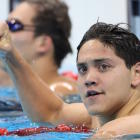WASHINGTON D.C. -- The NCAA will likely "very quickly" address a rule that allowed a University of Texas swimmer to receive $740,000 from Singapore for winning a gold medal at the 2016 Rio Olympics, NCAA president Mark Emmert said Thursday.
Joseph Schooling, a junior at Texas, won gold in the 100-meter butterfly at the Olympics, defeating a field that included Michael Phelps. The Singapore National Olympic Council awarded Schooling nearly three-quarters of a million dollars, an amount he can keep without losing his college eligibility due to NCAA rules tied to Olympic awards.
"To be perfectly honest, it's caused everybody to say, 'Oh, well that's not really what we were thinking about,'" Emmert said Thursday during a discussion about college sports at The Aspen Institute. "So I don't know where the members will go on that. That's a little different than 15 grand for the silver medal for swimming for the US of A. So I think it's going to stimulate a very interesting conversation."
The United States Olympic Committee's Operation Gold rewards medalists with $25,000 for a gold, $15,000 for a silver and $10,000 for a bronze. Athletes can receive multiple awards in Olympic years, money the NCAA allows them to keep. For instance, U.S. swimmer Katie Ledecky pocketed $115,000 that she can keep despite being enrolled at Stanford, where she will start swimming in 2016.
The USOC's Operation Gold program has been accepted under NCAA rules since 2001. But in past Olympics, Schooling wouldn't have been able to keep the $740,000 and still compete in college. That changed in 2015 when, citing fairness, the NCAA passed a rule that allows an exception for the Operation Gold program to include international athletes as well.
"The membership back [in 2001] was comfortable with that because it was such a rare occasion that somebody would be a college student and go out and win a medal," Emmert said in an interview after his speech. "They get to do it once in their career, maybe, because it was once every four years. The members at that time hadn't anticipated -- at least this is what I've been told -- this phenomenon of like the Singaporean kid getting paid a very large amount. I suspect they're going to want to address this quickly because that's a very different notion than just covering their training costs."
The NCAA's allowance of money to Olympic winners speaks to how all over the map it is when defining amateurism. This was noted by U.S. District Judge Claudia Wilken, who wrote the following in a 2014 ruling in the Ed O'Bannon case: "The association's current rules demonstrate that, even today, the NCAA does not necessarily adhere to a single definition of amateurism."
The NCAA now clings to a new definition of amateurism based on the 9th U.S. Circuit Court of Appeals' decision in O'Bannon that ties athlete compensation to educational expenses. Both sides have asked the Supreme Court to hear an appeal, which it will review late this month.
Allowing Olympians to get paid for winning medals creates all sorts of questions about inconsistencies. If swimmers and gymnasts can be paid for the Olympics, why not basketball and football players for other forms of outside compensation?
"I think the whole fundamental question now is whether getting compensated or reimbursed for your training costs -- a model that was 15 years old -- is one that makes sense today," Emmert said. "... My own notion is that if it was consistent with covering legitimate training costs, if that was the original intention, I think that makes sense."
Then there's the question of a threshold for an allowable amount. Why would Ledecky making $115,000 be OK but Schooling getting $740,000 be an issue? Once a line has been crossed to paying athletes, how does the NCAA say one amount is acceptable and another is not?
In all my years of covering NCAA topics, Emmert's remarks Thursday about Olympians struck a tone with my readers more than almost any issue I can remember. When I tweeted a quick summary of Emmert's comments, readers overwhelmingly flooded me with disgust for the NCAA.
Maybe it's because Schooling is a lower-profile NCAA athlete and an Olympian. Maybe it's because everyone knows he earned that money himself that has nothing do with the NCAA.
@JonSolomonCBS NCAA is hypocritical; they want to keep athletes poor while enriching themselves. Shame in the NCAA
— Michael A Beaton (@MichaelBeaton) September 8, 2016
@JonSolomonCBS God forbid the athletes actually make the they earn...instead of giving it to the suits.
— Aaron Friedman (@AaronFriedman15) September 8, 2016
Whatever the reason, the NCAA's concern about Schooling -- which I suspect may be for legal arguments to prevent football and basketball players from getting paid from pending litigation -- struck a chord with readers.
During Emmert's talk, moderator Tom Farrey mentioned a fundamental point in the NCAA's flawed concerns. Allowing Olympians to get paid doesn't cost the NCAA a dime. It's outside money paid to Olympians by a country's governing Olympic committee.
"Yeah, the question is whether that person is still an amateur," Emmert replied. "Because if they competed in South Africa and been paid $750,000 to play [basketball] in South Africa, they would be declared a professional athlete and not be eligible for the NCAA."
"Does it matter?" Farrey asked.
"I think it does," Emmert replied. "I think the amateur model is still very important."
It's OK to pay Olympians, but not too much. It's OK to pay Olympians, but not basketball and football players.
Round and round the definition of "amateur" goes.
















